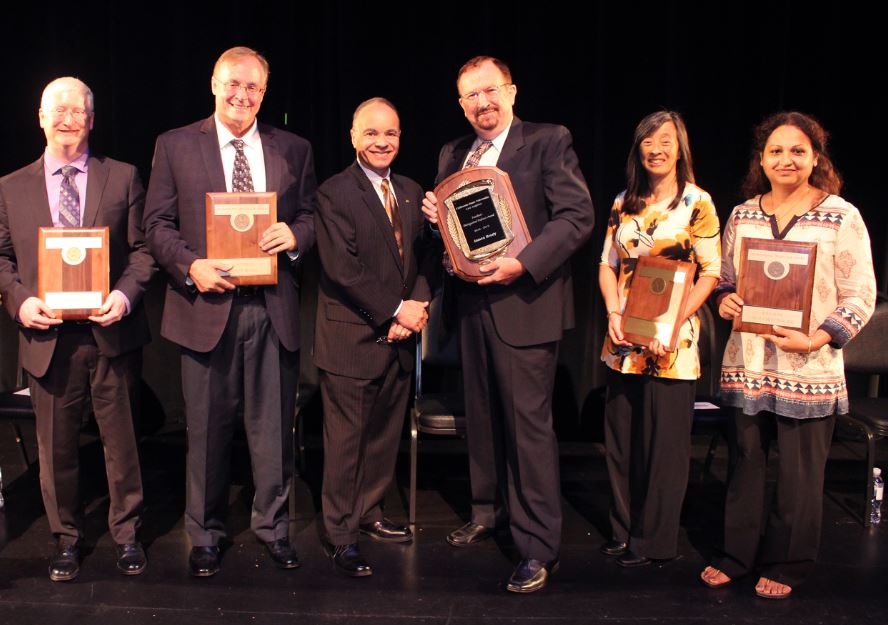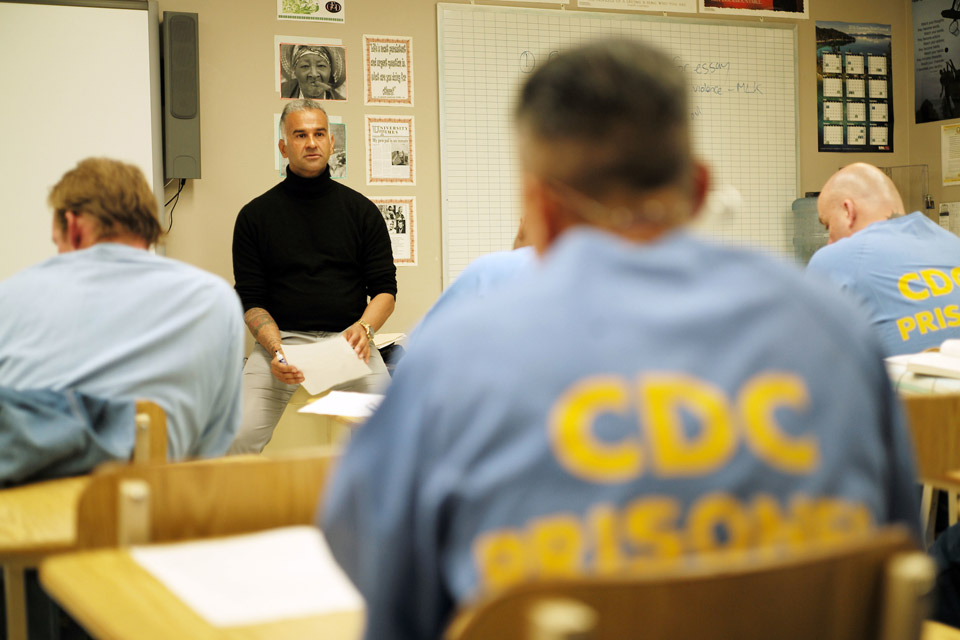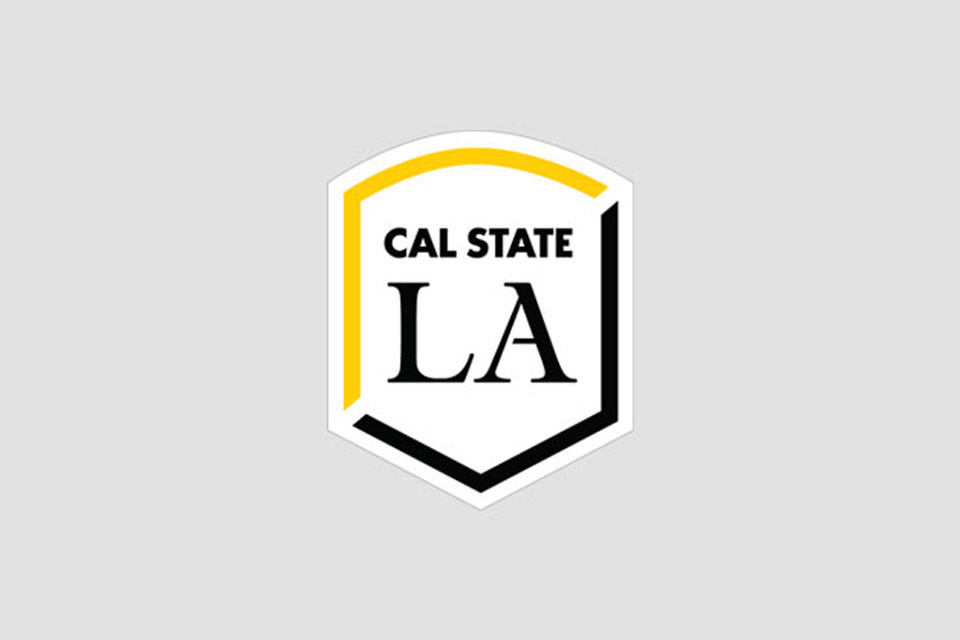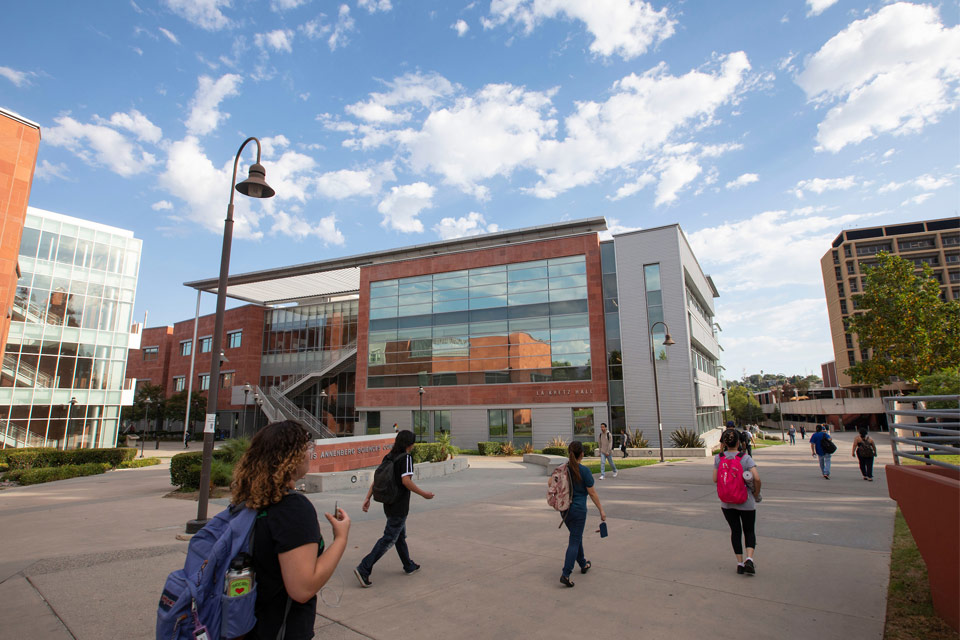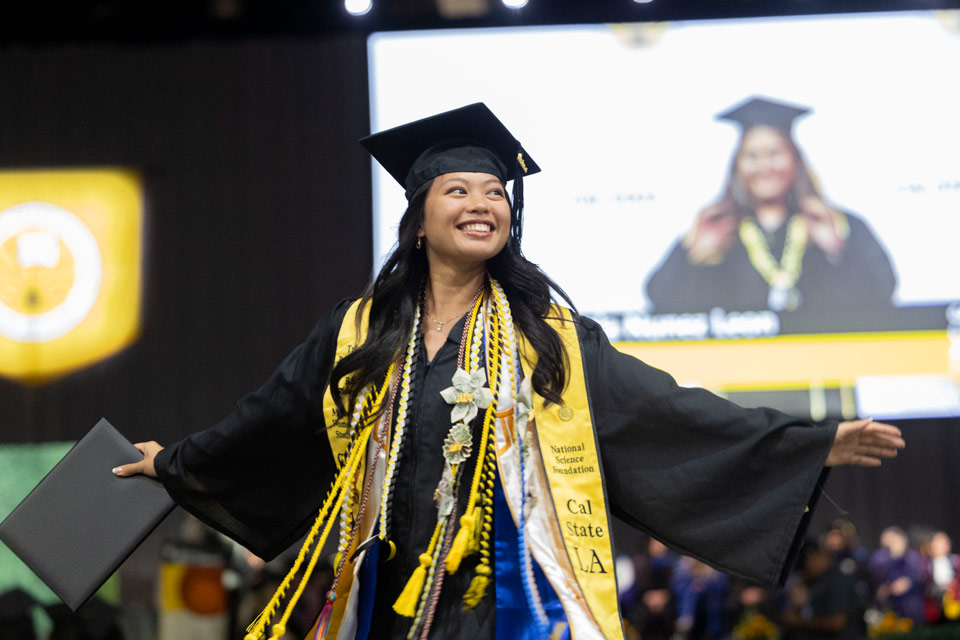Presented with Outstanding Professor Awards were:
- Choi Chatterjee, a distinguished historian whose work has been widely published locally and nationally (Altadena resident);
- D. Robert DeChaine, a prominent scholar in communication studies whose journals have garnered rave reviews (Claremont resident);
- Barry Hibbs, an expert in the field of hydrogeology who has conducted cutting-edge research on groundwater and environmental issues (Thousand Oaks resident); and
- Jun Liu, a professional translator who has been recognized as an international scholar in Western literature and critical theory (Arcadia resident).
This year’s Outstanding Lecturer Award was presented to Lecturer Connie Wong (Eagle Rock resident) who has more than 25 years of professional experience as a physical therapist.
At Cal State L.A., the annual Outstanding Professor Awards recognize excellence in teaching and cite significant achievements in scholarly inquiry or creativity, professional activities, and service to the campus and community. The President’s Distinguished Professor Award is presented to a previous Outstanding Professor award recipient and recognizes superlative teaching and exceptional commitment to students, as well as professional accomplishments and services.
PRESIDENT’S DISTINGUISHED PROFESSOR:
James Brady, Professor of Anthropology – College of Natural and Social Sciences
Professor James Brady is recognized internationally for his innovative field research and credited by preeminent scholars for creating a new sub-discipline of Maya cave archaeology.
Brady was born in Rochester, NY, and moved to Southern California at the age of 5. He received his Bachelor of Arts in Anthropology from UC Berkeley in 1970. Brady applied and was accepted to the graduate program at California State College, Los Angeles. Brady credits the faculty in the Anthropology Department with passing on a solid foundation in the discipline that would serve him his entire career, and he calls Jon Olson the best teacher he has seen at any institution. By the time he received his Master of Arts in Anthropology in 1974, the diploma read, “California State University, Los Angeles,” reflecting that name change that occurred while he was a student.
In 1979, Brady took a vacation to Guatemala that would change his life. The one-month visit turned into a two-and-a-half-year stay. He rediscovered his love of Mesoamerican archaeology, which had been initially inspired by a summer school experience in Mexico in 1968. In early 1981, he was given the opportunity to direct the survey of Naj Tunich, a Maya cave site that became the cover story for the August 1981 issue of National Geographic. The next year, Brady was accepted into the doctoral program at UCLA. By the time he left Guatemala, he had married fellow archaeologist Sandra Villagrán.
At UCLA, Brady quickly distinguished himself. Starting in 1985, his articles began appearing in professional publications. In 1987, he won the Best Student Paper competition at the Southwestern Anthropological Association Meeting, two Fulbright Fellowships and a National Science Foundation Dissertation Improvement Grant. His Fulbright stay in Guatemala was delayed until February of 1988 by the birth of his daughter, Alezandra. When he earned his Ph.D. in 1989, he was named the Outstanding Graduate Student of UCLA’s graduating class.
At Cal State L.A., Brady teaches Maya archaeology, material culture, geoarchaeology, cultural anthropology and Maya ritual cave use. Supported by external funding, he has conducted field schools in Mexico and Guatemala and his students regularly present the findings of their research at professional meetings. He has an impressive record of students, both graduate and undergraduate, who have published. Four of his students have won Sally Casanova Pre-Doctoral Fellowships from the CSU system in the last five years.
Brady has published seven books or chapters and 120 articles, some of them in leading journals in the field that he has pioneered. He has also garnered numerous grants from the National Science Foundation and the National Geographic Society. In 2006, Brady was presented a 2006 Distinguished Faculty Alumnus award by the Cal State L.A. Association and, in 2008, he received Cal State LA.’s Outstanding Professor Award.
Additionally, Brady’s research has been featured in the Discovery Channel special, “The Cave of the Glowing Skulls,” and he has appeared on the History Channel, The Learning Channel, A&E, and National Geographic Explorer. One of the projects with students has appeared as a cover story of the Science News. Numerous other articles on Brady’s projects have been featured in Estylo, Smithsonian Magazine, Archaeology Magazine, The Chronicle of Higher Education, Los Angeles Times and in international publications.
OUTSTANDING PROFESSORS:
Choi Chatterjee, Professor of History – College of Natural and Social Sciences
Choi Chatterjee was born in Kolkata, India, a city that is famous for its poets, revolutionaries, and poverty. She developed an interest in Russian literature and history early during her undergraduate years and, in 1988, she attended Indiana University, Bloomington, for her Ph.D. in Soviet History.
A Cal State L.A. faculty member since 1994, Chatterjee is responsible for the History Department’s undergraduate and graduate courses in Russian and Soviet history. She has also created courses in comparative European history, Russian-American relations, globalization, and food justice. She has served as coordinator of the History Department’s Teaching Preparation Program, and she teaches an Honors College upper division theme class on globalization that she co-created with Dr. Scott Wells.
Chatterjee’s research is wide ranging and she has published in the fields of world history, Russian-American relations, and transnational history. She currently serves on the editorial board of an international research project entitled, Russia’s Great War and Revolution. She has served on numerous committees for the international organization, Association for Women in Slavic Studies.
Currently, she is engaged in a transnational oral history project and is interviewing undocumented women workers between the ages of 50 and 60 in Los Angeles, Moscow, Kolkata, and Karachi about their life histories and their hopes and fears for the future. Last year, she co-curated an exhibition on Soviet era art works from the Wende Museum in Culver City, entitled Politics of Happiness and Dreams of the Future, in the Fine Arts Gallery at Cal State L.A.
D. Robert DeChaine, Professor of Liberal Studies/Communication Studies – College of Arts and Letters
D. Robert DeChaine is described as “a prominent scholar in Communication Studies” and attributed for offering new approaches to rhetorical analysis for our globalizing world with his cutting-edge scholarship on globalization and transnational movements.
DeChaine’s research focuses on how individuals and groups use rhetoric to shape understandings of citizenship, mobilize constituencies and enact social change. His research has been published in numerous scholarly journals and presented throughout the United States. He is author of the book, Global Humanitarianism: NGOs and the Crafting of Community, and editor of Border Rhetorics: Citizenship and Identity on the US-Mexico Frontier.
At Cal State L.A., where he has taught for more than 15 years, he teaches courses in rhetorical theory, cultural studies, human rights, social movements, globalization, immigration and community studies. He has served as a faculty advisor for the Feminist Majority Leadership Alliance and a supervising editor for Colloquy, the student-based scholarly journal of the Department of Communication Studies for the past three years.
DeChaine has assumed numerous leadership roles in regional and national professional associations, including serving on the Executive Council, the governing body of the Western Communication Association. He is also on the Editorial Board for the Quarterly Journal of Speech, the flagship journal in the field of communication studies. He has also served as a manuscript reviewer for numerous academic publishers and multiple scholarly journals.
Barry Hibbs, Professor of Geosciences and Environment – College of Natural and Social Sciences
With his reputation and expertise in the field of hydrology, Barry Hibbs headed a multi-agency, multi-university investigation of the availability, salinization, and numerical modeling of transboundary groundwater resources of the Texas/Mexico border. Hibbs was also selected by the National Water Research Institute to serve on the Independent Advisory Panel to provide expert peer review of the technical, scientific, regulatory and policy aspects of a groundwater replenishment (GWR) project for the City of Los Angeles’ Department of Water and Power.
Hibbs has conducted research on the U.S./Mexico border Paso del Norte region, and he has produced scientific discoveries and knowledge with respect to transboundary groundwater resources. In another research, he developed the hypothesis of the origin of selenium from the sediments of the historic Swamp of the Frogs Marsh in San Diego Creek Watershed and he proved that groundwater base flows account for much of the selenium and nitrate loading in surface waters in the watershed.
The recognition of his groundwater and watershed research led to Hibbs’ Geological Society of America (GSA) Fellowship in 2012. GSA states “fellowship is an honor that is bestowed on the best of our profession in recognition of distinguished contributions to the geoscience.”
Hibbs, who has taught at Cal State L.A. since 1997, developed the M.S. program and M.S. degree option in hydrogeology on campus. Additionally, Hibbs has received more than 2 million dollars in external funding to support applied research as well as to support student mentoring and program/curriculum development.
Jun Liu, Professor of English – College of Arts and Letters
Jun Liu, also known by his pen name Toming Jun Liu, received his education in China, the United Kingdom and the United States. He was a professional translator at the United Nations Secretariat in New York from 1981 to 1984. His book-length translation of the famous Chinese writer Mu Xin, titled An Empty Room: Stories, was published by New Directions in 2011 and received praise from many reviewing venues. In 2013, his translation of Mu Xin’s “SOS” was nominated for the Pushcart Prize.
A Cal State L.A. faculty since 1992, Liu has taught a wide variety of courses in such areas as composition, critical theory, 20thcentury American literature, American ethnic literature, diasporic literature, and 19th and 20th century European literature. In addition, he has designed and regularly taught a course in the Asian and Asian American Studies Program entitled “Ancient East Asian Literature and the Modern World.”
Currently, Dr. Liu is on the editorial committees of three academic journals: Journal of East-West Thought, Foreign Literature, and Chinese Translators’ Journal. As a columnist for the progressive Chinese newspaper Southern Weekend, he regularly contributes prose on literary, social, and political issues and is tagged by as many as 5 million Chinese online readers as a noteworthy author.
Three universities in China have awarded him honorary titles to recognize him as a significant international scholar in Western literature and critical theory. In 2014, he submitted an article at the invitation of the Congress of Mexico that will be published as part of a book in commemoration of the 2014 Year of Paz in Mexico.
OUTSTANDING LECTURER:
Connie Wong, Kinesiology and Nutritional Science Lecturer – College of Health and Human Services
This year’s Outstanding Lecturer is Connie Wong, a physical therapist with 25 years of experience in diverse settings throughout Los Angeles County. Her particular specialty involves home and community therapy with a cognitive rehabilitation focus. She has worked extensively with clients who are post-brain injury, spinal cord injury and multiple traumatic injuries, as well as with a variety of orthopedic diagnoses.
Wong has been a lecturer at Cal State L.A. for seven years and teaches in the School of Kinesiology and Nutritional Science. Her primary courses include rehabilitation modalities and principles of mobility training and exercise for clients with physical impairments.
Additionally, she supervises The Mobility Center, a service learning therapeutic exercise laboratory, where student trainers work with clients from the university and the surrounding communities on improving their fitness, wellness, and overall functional status. The Center is now recognized as a significant resource for numerous underinsured and uninsured clients from throughout Los Angeles who seek rehabilitative exercise interventions. It is also a source of meaningful part-time work for Kinesiology students who strive to be employed in a field related to their future graduate careers, which include physical therapy, occupational therapy, athletic training, and chiropractic practice.
Wong has also fostered collaborations within and outside of the Cal State L.A. community to further the University’s civic engagement goals—for example, with Esperanza Community Housing Corporation in South Los Angeles.

